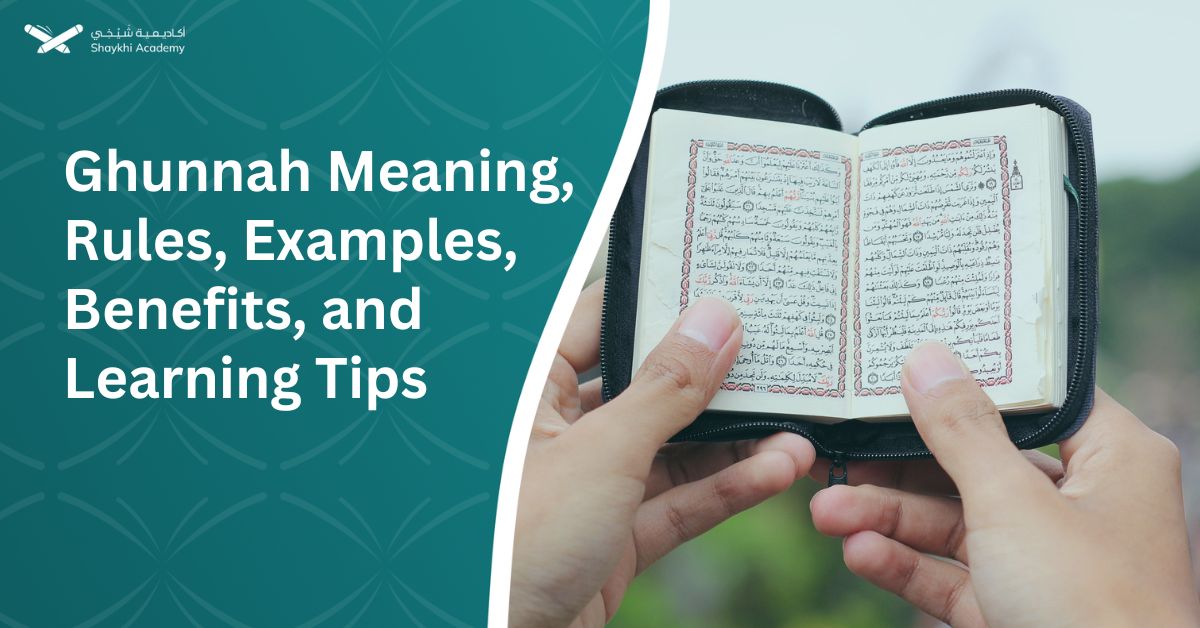Are you eager to delve into the intricate world of Ghunnah and unlock its secrets? Ghunnah adds depth and richness to the pronunciation of specific Arabic letters. Mastering Ghunnah in Tajweed, the science of Quranic recitation, unlocks a deeper understanding and appreciation of the holy text.
This article delves into the world of Ghunnah, exploring its definition, application in Tajweed, and the benefits of incorporating it into your recitation. By the end, you’ll be equipped with the knowledge and exercises to elevate your Quran recitation and connect with the Quran on a whole new level. So, are you ready to unlock the beauty of Ghunnah? Let’s begin!
In a nutshell, Ghunnah is a nasalization sound produced in Arabic by directing air through the nasal cavity. It’s particularly important for reciting the Quran correctly and beautifully. Mastering Ghunnah involves understanding the different letters and situations where it applies, along with the different durations for which the nasal sound is produced.
There are four main types of Ghunnah, and practicing with a teacher or using online resources can help you perfect your pronunciation. By mastering Ghunnah, you can achieve accurate recitation, enhance your fluency, and elevate the beauty of your Quran reading.
What is Ghunnah?
Ghunnah, derived from the Arabic word for nasalization, refers to the resonance created by directing airflow through the nasal cavity while producing specific Arabic letters. So, Ghunnah refers to the phenomenon of nasalization in pronunciation.
It occurs when airflow during the articulation of certain Arabic letters is directed partially through the nasal passage, resulting in a distinctive nasalized sound. This feature is pivotal in Arabic phonetics, especially in Quranic recitation.
Ghunnah in Arabic
In Arabic language study, Ghunnah specifically pertains to the letters Noon (ن) and Meem (م), particularly when they are in a non-vocalized state (Sakin) or when accompanied by a Shaddah (emphasis mark). Nasalization, indicated by Ghunnah, plays a crucial role in the correct pronunciation and preservation of the language’s linguistic integrity.
Ghunnah in Tajweed
Ghunnah in Tajweed holds immense significance, it is integral to maintaining the correct pronunciation and melodic rhythm of Quranic verses. Therefore, understanding the rules and application of Ghunnah is essential for those aiming for accurate recitation and understanding of the Quran.
Here’s what Ghunnah signifies in Tajweed:
- Nasalized sound: Produced when pronouncing Noon and Meem particularly with a Shaddah.
- Production: Involves vibrating vocal cords while diverting airflow partially through the nose.
- Length: Maintained for a specific duration (roughly two counts) during recitation.
- Application: Occurs with the letters Noon and Meem, particularly when they are in a non-vocalized state (Sakin) or when accompanied by a Shaddah
What are Ghunnah Letters?
The Arabic letters ن (noon) and م (meem) are called the Ghunnah letters. These letters are pronounced with a nasal sound, meaning that the air is passed through the nose while they are being said. The tanween (nunation) is also considered a Ghunnah letter.
Here are the examples with transliteration:
- “إِنَّا أَنزَلْنَاهُ فِي لَيْلَةِ الْقَدْرِ”
“Inna anzalnahu fee laylati alqadri” (Surat Al Qadr, 97:1)
In this verse, the word “إِنَّا” (inna) contains the letter “ن” (noon), which is a Ghunnah letter. When pronounced, the Ghunnah should be intensified, meaning the nasal sound should be prolonged for two vowel counts.
- “عَمَّ يَتَسَاءَلُونَ”
“AAamma yatasaaloona” (Surat An-Naba. 78,1)
Here, the word “عَمَّ” (amma) contains the letter “م” (meem), which is another Ghunnah letter. Similar to the previous example, proper Ghunnah execution mandates prolonging the nasal sound for two vowel counts.
Understanding these letters is vital for accurate pronunciation, particularly in Quranic recitation.
What are the Rules of Ghunnah?
There are main four ranks or types of Ghunnah, which describe the duration for which the nasal sound is produced:
1. Most Complete Ghunnah
This is the longest duration of nasalization. It applies to Noon (ن) and Meem (م) with a Shaddah, Meem Mushaddadah (doubled Meem) and Noon Mushaddadah (doubled Noon).
And also occurs in Idgham with Ghunnah, which happens when a Noon Sakinah or Tanween is followed by specific letters ( ي، ن، م، و ).
Examples: “عَمَّ يَتَسَاءَلُونَ” (Amma Yatasā’alụn) and “كَلَّا إِنَّهَا تَذْكِرَةٌ” (Kalla innaha tadhkirah).
2. Complete Ghunnah
This is the second-longest duration. It occurs in Ikhfa Haqiqi and Ikhfa Shafawi.
Example: “إِنَّ الْإِنسَانَ لَفِي خُسْرٍ” (Inna alinsana lafee khusrin)
3. Incomplete Ghunnah
This is a shorter nasalization than the complete Ghunnah. It applies to Noon Sakinah and Meem Sakinah pronounced with Izhar, which means clear pronunciation.
Example: “فَصَلِّ لِرَبّكَ وَانْحَر” (Fa Salli li Rabbika wanhar)
4. Most Incomplete Ghunnah
This is the shortest duration of nasalization. It applies to Noon and Meem with regular vowels.
Examples: “فَوَسَطْنَ بِهِ جَمْعَا” (Fawastaṭna bihi Jamī’an) and “لَا أَعْبُدُ مَا تَعْبُدُونَ” (La A’budu ma Ta’budūna)
Additional Examples of Ghunnah
One of the benefits of Tajweed is that it enables us to accurately and correctly recite the Quran. Here are some examples of verses where Ghunnah is evident:
1. {الَّذِينَ يُؤْمِنُونَ بِالْغَيْبِ وَيُقِيمُونَ الصَّلَاةَ وَمِمَّا رَزَقْنَاهُمْ يُنفِقُونَ}: [Surah Al-Baqarah: 3]
(Allatheena yuminoona bialghaybi wayuqeemoona alssalata wamimma razaqnahum yunfiqoona). In the word (ممّا), the second meme is emphasized, and there is Ghunnah assimilation.
2. {فَمَنْ يَعْمَلْ مِثْقَالَ ذَرَّةٍ خَيْرًا يَرَهُ}: [Surah Az-Zalzalah: 7]
(Faman yaAAmal mithqala tharratin khayran yarahu). In the phrase (خيرًا يره), where the tanween in (خيرًا) is followed by the letter ya in (يره), thus the tanween rule becomes assimilation with Ghunnah.
3. {وَلَقَدْ جِئْنَاهُم بِكِتَابٍ فَصَّلْنَاهُ عَلَى عِلْمٍ هُدًى وَرَحْمَةً لِّقَوْمٍ يُؤْمِنُونَ}: [Surah Al-A’raf: 52]
(Walaqad jinahum bikitabin fassalnahu AAala AAilmin hudan warahmatan liqawmin yuminoona). The ya after the tanween in (لقومٍ يؤمنون).
4. {وَمَا بِكُم مِّن نِّعْمَةٍ فَمِنَ اللَّهِ ۖ ثُمَّ إِذَا مَسَّكُمُ الضُّرُّ فَإِلَيْهِ تَجْأَرُونَ}: [Surah An-Nahl: 53]
(Wama bikum min niAAmatin famina Allahi thumma itha massakumu alddurru failayhi tajaroona) Ghunnah in (مِّن نِّعْمَةٍ).
5. {وَآتُوهُم مِّن مَّالِ اللَّهِ الَّذِي آتَاكُمْ}: [Surah An-Nur: 33]
(waatoohum min mali Allahi allathee atakum) Ghunnah in (مِّن مَّالِ).
6. {وَمَا أَنْتُمْ بِمُعْجِزِينَ فِي الأَرْضِ وَلا فِي السَّمَاءِ وَمَا لَكُمْ مِنْ دُونِ اللَّهِ مِنْ وَلِيٍّ وَلا نَصِيرٍ}: [Surah Al-Ankabut: 22]
(Wama antum bimuAAjizeena fee alardi wala fee alssamai wama lakum min dooni Allahi min waliyyin wala naseerin) When the noon sakina comes before the waw in a word like (مِنْ وَلِيٍّ).
7. {أَيَحْسَبُونَ أَنَّمَا نُمِدُّهُمْ بِهِ مِنْ مَالٍ وَبَنِينَ}: [Surah Al-Mu’minun: 55]
(Ayahsaboona annama numidduhum bihi min malin wabaneena) When the noon sakina comes before the meem in a word like (مِنْ مَالٍ).
What are the Benefits of Mastering Ghunnah?
Mastering Ghunnah in Tajweed offers several benefits, both practical and spiritual, for individuals striving to perfect their Quranic recitation. Here are some of the key benefits:
1. Accurate Pronunciation
Ghunnah ensures the correct pronunciation of letters, particularly Noon (ن) and Meem (م), when they bear a Shaddah or appear in a Sakinah state. Mastering Ghunnah enables reciters to articulate these letters with precision, maintaining the integrity of the Quranic text.
2. Enhanced Recitation Skills
By understanding and applying the rules of Ghunnah, learners can enhance their overall recitation skills. Ghunnah adds depth and beauty to the recitation, contributing to a melodious and captivating delivery of Quranic verses.
3. Preservation of Linguistic Beauty
Proper application of Ghunnah preserves the linguistic beauty of the Quran. Nasalization adds a unique dimension to the recitation, enriching the auditory experience and honoring the eloquence of the Quranic language.
4. Spiritual Connection
Mastering Ghunnah fosters a deeper spiritual connection with the Quran. Reciters who accurately pronounce Ghunnah demonstrate reverence and respect for the sacred text, cultivating a sense of devotion and humility in their recitation practice.
5. Fulfillment of Religious Duty
Tajweed including the mastery of Ghunnah, is an essential aspect of fulfilling the religious duty of reciting the Quran correctly.
Tips for Learining Ghunnah:
Understanding the theory of Ghunnah is a great first step. Here’s how to take your Ghunnah pronunciation to the next level:
- Listen to Quran Recitations: Immerse yourself in the sounds of qualified Quran reciters. Pay close attention to how they handle Ghunnah in different contexts.
- Practice with a Teacher: A qualified Tajweed teacher can provide personalized guidance and correct any pronunciation errors you might have.
- Record Yourself: Record yourself reciting Quran and listen back to identify areas where your Ghunnah needs improvement.
- Use Online Resources: Many online resources offer audio demonstrations and visual aids to help you master Ghunnah.
Practicing Ghunnah:
Here are some exercises to solidify your Ghunnah pronunciation:
- Isolate the Sound: Begin by practicing the Ghunnah sound itself. Try humming while closing your mouth to feel the nasal vibration.
- Focus on Individual Letters: Practice pronouncing Noon and Meem with a Shaddah, extending the nasalization for the prescribed duration.
- Move on to Words: Once comfortable with isolated letters, practice words with Ghunnah, like “مَن” (Man) and “نِعْمَة” (Ni’mah).
- Quranic Verses: Finally, integrate Ghunnah practice into your Quran recitation routine.
Mastering Ghunnah Tajweed Rule and Beyond
Ghunnah, the resonating nasal sound in Quran recitation, adds depth and richness to your voice. But mastering it requires proper understanding and technique.
This article delved into the intricacies of Ghunnah, exploring its definition, the letters it applies to, and its significance in Tajweed. Now, imagine confidently applying this knowledge to enhance your Quran recitation!
Ready to take your Quran recitation to the next level?
Shaykhi Academy’s Online Tajweed Course
Join Shaykhi Academy’s Online Tajweed Course and gain a comprehensive understanding of Ghunnah, along with all other essential Tajweed rules.
In our online course, you’ll:
- Deepen your understanding of Ghunnah: Learn the proper pronunciation techniques for the letters Noon (ن) and Meem (م) with Shaddah, ensuring you achieve the perfect nasal resonance.
- Master the application of Ghunnah: Explore various scenarios where Ghunnah is used and how it interacts with other Tajweed rules, like Idgham (complete or partial assimilation).
- Practice under expert guidance: Receive personalized feedback from certified tutors who will refine your Ghunnah pronunciation and ensure you apply it accurately.
Beyond Ghunnah, Shaykhi offers a holistic Tajweed learning experience:
- Cover all aspects of Tajweed: Learn about Makharij (articulation points), Sifat (characteristics) of letters, proper pronunciation, and advanced Tajweed concepts.
- Flexible learning: Choose a study plan that suits your needs and budget, with options for families and special discounts.
- Seamless online platform: Our interactive tools make learning Tajweed engaging and efficient, allowing you to focus on mastering Ghunnah and other Tajweed rules.
- Unwavering support: Enjoy the freedom to choose your preferred tutor and cancel your subscription anytime if needed.
Unlock the secrets of beautiful Quran recitation by enrolling in Shaykhi’s Online Tajweed Course today.
Let Shaykhi Academy be your guide on this enriching journey. Book your FREE trial today!

Conclusion
In conclusion, mastering Ghunnah is an essential aspect of Tajweed, offering a multitude of benefits for those seeking to elevate their Quran recitation.
By understanding its definition and function in both Arabic and Tajweed, learners can achieve accurate pronunciation, enhance the flow and beauty of their recitation, and contribute to the preservation of the Quran’s linguistic integrity.
With dedication and practice, incorporating Ghunnah exercises and guidance from qualified teachers will allow you to unlock the deeper beauty and meaning within the verses of the Quran.

















































